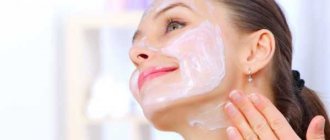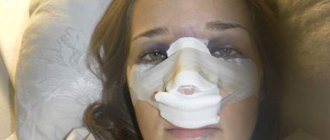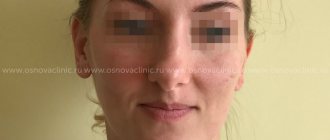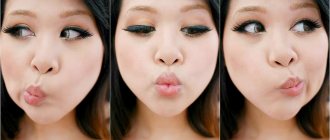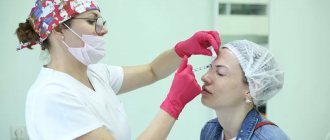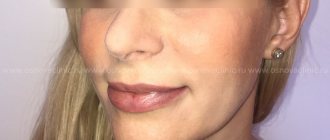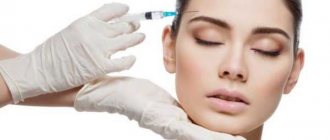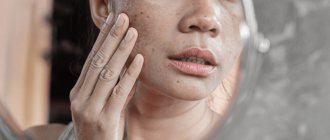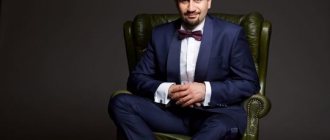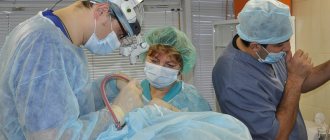Even a brilliantly performed rhinoplasty can be ruined by the correct behavior and disobedience of the patient during the rehabilitation period. What can and cannot be done after rhinoplasty?
If you have not had rhinoplasty yet, be sure to read our article about the preparation and features of this operation.
The first days after the procedure are very important:
- You cannot remove tampons from your nose yourself, even for a very short time. If they cause great inconvenience, you need to be patient.
- The outer lining also cannot be removed independently, since it will no longer be possible to return it to its previous position. It maintains the new shape of the nose; if the bandage is removed earlier than two weeks, complications may arise. In certain cases (with a slow healing process, as well as during complex operations), the bandage must be worn even longer.
- You can only sleep on your back with your head slightly raised on a high pillow. You can't sleep on your side.
If you have already had rhinoplasty , then you will be interested in the article “How many days after rhinoplasty is the cast removed?”
Why can’t you wear glasses and touch the stitches after rhinoplasty?
When the bandage is removed, even a light touch to the stitches can lead to deformation of the scar and infection. Therefore, at first you can touch your nose, but very carefully and not where the stitches are.
You can't wear glasses for about one and a half to two months. They put pressure on the bridge of the nose, as a result of which its shape may change. If your vision is poor, you may want to consider purchasing contact lenses to wear until you can wear glasses.
What's prohibited?
- Baths, saunas
Sudden temperature changes are very harmful for a newly corrected nose. Therefore, any specialist will tell you: you should not go to the bathhouse or sauna immediately after surgery.
Moreover, you should not do this during the first two months.
Contrast showers and hot baths can also cause complications and poor health.
It is best to use warm water for bathing.
- Solariums, beaches
You should not sunbathe for two months after rhinoplasty.
Ultraviolet rays when exposed to the skin can cause hyperpigmentation of the nose. Therefore, it is worth using sunscreen, even just when going outside.
- Pool
In the first two months after rhinoplasty, you should not go to the pool. This is due to the high risk of catching a cold or infection.
- Hot/cold
It is not recommended to drink hot coffee and eat ice cream. You should abstain from these products for 2 months.
I would also recommend sticking to a salt-free diet. This will help reduce swelling.
- Sport
You should forget about sports for 2-3 months. Even about simple actions like bending forward or turning your head.
Moreover, this restriction also applies to professional athletes. Your body also needs time to recover.
- Alcohol and cigarettes
Need I say that drinking alcohol and smoking during the rehabilitation period is unacceptable?
Alcohol affects blood vessels. Because of this, blood flow is disrupted.
Alcohol increases the risk of blood clots.
Alcohol increases swelling
And even if you ignore all of the above, it is worth remembering that a drunk person is unsteady on his feet and can damage the newly made nose.
- Glasses
The frame puts pressure on the bridge of your nose, so it will hurt. In addition, there is a risk of deformation.
I recommend using contact lenses for at least two to three months.
How to properly and carefully care for your face after rhinoplasty?
Deep facial cleansing should not be done after rhinoplasty for at least a month. To cleanse the skin, it is best to use gentle cosmetics.
Sometimes the question arises: is it permissible to massage the nose? If after surgery a small hump of cartilaginous origin appears, the doctor may prescribe several massage sessions. In this case, the facial skin should be smeared only with those ointments that were prescribed by the doctor.
Is it possible to rinse the nose and what is the best way to do it after surgery? You can wash it, but you need to do it correctly. It is best to consult with your plastic surgeon so that he can give recommendations regarding the choice of the right products and the intensity of the process. In normal cases, the following rules apply:
You should start rinsing your nose 3-4 days after surgery. Usually at this time the tampons are already removed.
In the first month after the procedure, it is best to do this three times a day with a weak saline solution or other means that are based on sea water. If after a month there is still a feeling of congestion or discomfort, you can extend the rinsing period.
How to rinse your nose correctly?
- Gently tilt your head slightly to the side over the sink.
- Take a deep breath. Then hold your breath for a while.
- Rinse the left nostril with a special pipette. After that, it is very easy to blow out the contents of the nose. It is important to do this very slowly, slightly blowing air and keeping your mouth open. You should not pinch the wing of your nose, but rather carefully close the right nostril with the pad of your finger.
- Then you should also rinse the right nostril.
After rinsing, of essential oils such as sea buckthorn, peach or apricot into your nose
Using rinsing, you can clean your nose well, which helps:
- reduce swelling or inflammation,
- restore blood vessels to their former elasticity,
- speed up the process of tissue repair,
- moisturize the mucous membrane in a timely manner and
- free the intranasal passages from dried blood and postoperative crusts.
- As a result, everything heals faster and breathing improves.
Reminder! When it comes to rinsing your nose, it is very important to follow your doctor's recommendations exactly.
Recommendations immediately after surgery
We congratulate you! You are one step closer to restoring your teeth. Now the most important thing is to follow all the recommendations so that rehabilitation takes place quickly and without complications. The most important thing on the first day is complete rest. It is important that the body recovers - and for this it needs strength. Try to get plenty of rest, read fascinating books, watch interesting and kind films - those that will help you take your mind off and will cause you only positive emotions.
Please try to stay at home for the first 2-3 days after the operation; you should not go on a business trip or far out of town - this will allow you to promptly contact your doctor if complications develop.
How long to keep a tampon in after surgery? Immediately after the procedure, the doctor will put a gauze pad on you, which you need to press to the wound and bite tightly (clench your jaw). This will stop the bleeding. You need to hold it for about 20 minutes, then remove it. If the blood oozes a little, take a new one - you don't want to hold it longer than that as it is a breeding ground for bacteria.
How to eat? After the operation, eating is prohibited for 2-3 hours, after which you can have a snack, but the food should be soft and warm (room temperature). The priority is light soup (puree soup is possible), cottage cheese, pureed vegetables, porridge. You should chew food on the opposite side of the surgical procedure.
What can you drink? Warm herbal tea, plain water, milk, compotes and fruit drinks. Drinks should also not be hot or excessively cold. It is better to avoid coffee and strong black tea - they increase blood pressure, which can lead to bleeding.
How to carry out hygiene? On the first day it is not required - it is enough to limit yourself to oral baths (carry out soda and saline solutions). Please do not use a toothbrush, irrigator, or even dental floss or toothpicks. All these means can lead to tissue damage in the operated area.
Important information! Rinsing after surgery is strictly prohibited, both on the first day and during the week. Such active actions can lead to suture dehiscence and loss of grafted bone material.
Is it possible to smoke? Highly undesirable. But if you can’t give up a bad habit, you should not smoke for at least the first two days, and after that, reduce your cigarette consumption to a minimum.
Can I drink alcohol? No, alcohol is strictly prohibited. First, it can cause a dangerous reaction when it interacts with antibiotics if you are taking them. Secondly, alcohol thins the blood, which can cause bleeding.
How should you sleep? Many patients note that after surgery in a horizontal position there is a pulsation in the head. To avoid increased blood pressure, sleep in a semi-sitting position - place several pillows under your head or a cushion under the mattress. It is important not to sleep on your side or cheeks, especially after complex operations, this can lead to bleeding, which will be normal, but may frighten you.
How to relieve pain after surgery? The effect of infiltration anesthesia finally wears off after 2-3 hours, conductive anesthesia after 5-6 hours, rehabilitation after intravenous sedation takes up to 24 hours. After this, you may begin to feel pain. In addition to painkillers, you will be prescribed anti-inflammatory and antihistamine medications. They also have an analgesic effect.
Whether you take painkillers or not is up to you. Monitor how you feel and the intensity of your pain. Many of our patients note that one tablet was enough for them on the first day, after which a completely tolerable monotonous pain persisted, which did not require taking painkillers and quickly disappeared.
Worried about bone grafting? We can perform surgery WITHOUT bone augmentation. All over the world, the vector of surgery is aimed at reducing tissue trauma, and sinus lifting and targeted bone tissue regeneration operations are an unnecessary surgical stage with fairly high rates of complete or partial default. Take a free consultation to find out more
sign up now
How to relieve swelling after surgery? After surgery, tissue swelling almost always occurs. As a rule, it is local, that is, limited to the gum area. But facial tissues are often affected, especially after a sinus lift - the cheek and sometimes the eye area swell. The swelling reaches its maximum on the third day.
To relieve swelling in the first hours after surgery, it is important to apply compresses - apply ice wrapped in a towel on the side of the cheek (3-5 minutes, repeat every 15 minutes for two hours).
Swelling is also relieved by medications - antihistamines and antibacterials, which will be prescribed to you by your doctor (if necessary).
Important! Warm and hot compresses are prohibited, as they can increase swelling and inflammation and accelerate the development of postoperative complications.
What medications should I take? After the operation, you will be prescribed certain medications - anti-inflammatory, antibacterial (antibiotics) and antihistamines. They must be taken as a course, without interrupting it when the first improvements appear.
If you have diabetes and pathologies of the cardiovascular system, monitor your blood sugar and blood pressure. Any operation is stressful, and stress is a release of adrenaline. Be sure to prepare all the necessary medications in advance and coordinate their use with your doctor (endocrinologist, cardiologist or therapist).
“When implanting teeth and increasing bone tissue, we use PRF membranes - this is a platelet mass obtained from the patient’s own blood. They significantly speed up the process of tissue healing, as they are enriched with growth factors natural to your body, due to which the rehabilitation period is reduced by 1.5-2 times.”
Aida Vladimirovna Jutova, implant surgeon, periodontist, work experience more than 9 years
Find out the benefits of blood plasma membranes Take a free consultation to find out more
sign up now
When can you appear in public and go to work after rhinoplasty?
Swelling and bruising after rhinoplasty will go down differently for different people. Most often, you can appear in public within 1–3 weeks.
Around this time you are allowed to go to work. This is only true if it is not associated with heavy physical activity.
We have prepared a separate publication about the resolution of swelling after rhinoplasty.
Types of rehabilitation
After rhinoplasty, the recovery stage is conventionally divided into early and late. Most often, the early period takes about 2-3 weeks, and during this time the patient goes through the above-mentioned postoperative signs: pain, hematomas and swelling. The late period is associated mainly with the individual recommendations of the surgeon and future scheduled examinations.
Limitations of the early rehabilitation period
* it is necessary to significantly reduce physical activity;
* you should avoid tilting your head forward and lifting heavy objects;
* for the first time after rhinoplasty, it is preferable to sleep on your back and on a high headboard;
* it is important to monitor the condition of the bandages and plaster retainers - they must be dry and clean;
Is it possible to yawn, sneeze, blow your nose, cry and laugh after rhinoplasty?
All of the above actions are natural for humans. We often do this without thinking. What happens after rhinoplasty? What do you need to remember?
Everything must be done so as not to damage the very sensitive nose immediately after surgery.
For example, you need to blow your nose very carefully. If you do this as usual, then a strong pressure drop occurs inside the nose, and the nose is often squeezed with your fingers. All this can damage the shape of the new nose and lead to complications.
It is better to sneeze with your mouth open so as not to create a lot of pressure in your nose.
When can you exercise after rhinoplasty?
Professional athletes are wondering if they can have plastic surgery and when can they return to sports after rhinoplasty?
Rhinoplasty plastic surgeons advise taking seriously the recommendation to limit physical activity during the recovery period.
Until the tampons in the nose are removed, you should under no circumstances be subjected to even minor physical exertion.
It is better to give up any sports activities for about 2-3 months.
You should especially avoid exercises that cause a rush of blood to the face: for example, turning your head, bending forward, running.
You cannot engage in serious sports for at least six months after surgery.
Can I practice boxing or other martial arts and dangerous sports after rhinoplasty? Doctors prohibit returning to sports that do not exclude possible injury to the nose. What explains this? A previously operated nose is much more difficult to heal after injuries.
Limitations after rhinoplasty
Rhinoplasty surgery is aimed at rapid, high-quality elimination of congenital or injury-related defects.
Plastic surgeon Alexander Aleksandrovich Markushin is a highly qualified specialist who uses progressive techniques and innovative equipment to correct the patient’s appearance as effectively as possible.
To avoid any negative consequences, you should follow all the doctor’s recommendations as accurately as possible. Otherwise, complications are possible, which may require re-operation or complex correction to eliminate. The safety and stability of the new nose shape directly depends on the strict implementation of the surgeon’s instructions.
Recovery period after rhinoplasty
The time for complete recovery of the body directly depends on the complexity of the surgical intervention, the condition of the individual patient’s body, and the accuracy of following the doctor’s recommendations for rhinoplasty.
The regeneration process lasts from a week to several months. During the entire recovery period, a patient who has undergone rhinoplasty must be extremely careful to ensure that the stitches do not come apart and that infection does not get inside. Unconditional compliance with the attending physician’s instructions has a positive effect on tissue restoration processes.
How long does it take to start breathing through your nose after rhinoplasty?
After rhinoplasty, the nasal canals are tightly packed with special turundas to fix the new shape of the nose. Soaked in ointment, which accelerates the healing process, gauze swabs are removed after 1-3 days. It all depends on the individual characteristics of the patient’s body, the complexity of the operation, and the body’s reaction to rhinoplasty.
The first days require maximum rest to avoid tilting the head, which can cause severe bleeding.
Recovery rates of the nostrils and bridge of the nose after rhinoplasty
You can see what positive changes have occurred after plastic surgery no earlier than in a month. After a plastic surgeon's work, it is usually better not to look in the mirror for several weeks to avoid psychological shock. Swelling and bruising give the face a rather unsightly appearance. Do not squeeze, palpate, or massage the adjacent areas, nose, or septum. If a special massage is needed to stimulate blood circulation and accelerate regeneration, it can only be performed by a specialist.
How long to sleep on your back after rhinoplasty?
After rhinoplasty, Dr. Markushin recommends that you continue sleeping on your back throughout the entire rehabilitation period.
- The first few days this is especially important, as it prevents possible deformations of the fragile septum.
- After removing the plaster cast, sleeping on your back is required to minimize the formation of facial swelling.
- Patients for whom this resting position is uncomfortable are advised to maintain a semi-sitting position while sleeping for 10-15 days after rhinoplasty.
Glasses after rhinoplasty
When planning to undergo rhinoplasty, it is necessary to take care of contact lenses in advance for those who have serious vision problems. Even an ultra-light plastic frame will put unacceptably strong pressure on the bridge of the nose. This can lead to cartilage deformation. You will need to stop wearing glasses until the new base of your nose is strong enough. This usually takes 1-3 months. It all depends on the complexity of the operation undergone.
Hygiene procedures, washing, shower, bath, sauna after rhinoplasty
Hygiene is an important part of every person's daily life. For the first few days, you should limit wiping your face with a damp cloth, thus preventing possible wetting of the plaster splint. If you take a shower, the water should be at room temperature so as not to provoke bleeding. Under no circumstances should you wash your hair for the first 5-10 days. Hot baths, saunas, swimming pools, saunas and contrast showers are completely excluded in the first few months. It is necessary to wait for complete tissue restoration.
Can I touch or put pressure on my nose after rhinoplasty?
For up to five days, while the external nose is protected by a splint, any rough manipulations with the tissues adjacent to the operation site are strictly prohibited. Washing should be reduced to light touches with a hygienic wet napkin. You should not blow your nose by squeezing your nose after surgery. If mucus accumulates after removing the turundas, it is necessary to rinse the nasal cavities with a weak disinfectant solution.
Smoking after rhinoplasty
Heavy smokers should start preparing one month before surgery to learn to avoid the bad habit. Cigarettes have a negative effect on the body, causing high blood pressure and at the same time constricting blood vessels, which slows down the flow of oxygen to the tissues. This greatly inhibits regeneration processes, slowing down the restoration of normal functioning of the body.
Alcohol after rhinoplasty
No matter what the alcohol content is in your favorite drink, you need to completely eliminate alcohol from the menu for the next few months. Beer, wine, whiskey, cognac, and low-alcohol drinks have an equally harmful effect on regenerative processes, causing bleeding and swelling.
Coffee, tea after rhinoplasty
To reduce the risk of severe swelling or bleeding, you must completely exclude any hot drinks from your diet for the next 1-3 months. In addition, green tea and coffee are strong stimulants that cause a sharp increase in blood pressure.
When can I start having sex again?
You should stop any physical activity for up to a month. Sex instantly stimulates a sharp increase in blood pressure, a rush of blood to all parts of the body, which will inevitably lead to severe nosebleeds. Careless touching of the nose after rhinoplasty can easily disturb the fragile shape, which will require additional correction or repeat rhinoplasty.
Sports after rhinoplasty
Even minor loads lead to a sharp increase in heart rate, increased blood pressure, and a sharp rush of blood to the face. This will definitely cause increased swelling or lead to severe nosebleeds. For the first 1-3 months, even simple physical exercises, breathing exercises or yoga should be avoided. Sports such as boxing, wrestling, acrobatics, swimming, hockey, football are strictly prohibited for at least a year.
Solarium after rhinoplasty
Avoid direct sunlight after rhinoplasty. Strong ultraviolet irradiation of the area undergoing surgery leads to hyperpigmentation, which negatively affects tissue healing processes. For up to two months, it is necessary to completely avoid going to the solarium, and if it is summer, then you can go out into the fresh air only in a wide-brimmed hat that completely protects your face from direct sunlight.
Visits to cosmetologists for filler injections
You cannot use decorative cosmetics for a month after surgery. Any injections that correct the shape of the nose are possible only as prescribed by a doctor in a clinical setting. Independent use of any drugs that can affect regeneration processes or change the shape of the nose is prohibited. Only the attending physician can prescribe additional correction if you notice that after the swelling disappears, the nose loses its definition.
After plastic surgery, any doctor’s recommendations become law for the patient until the body’s recovery process is completely completed. If you experience any discomfort, pain or severe swelling, you should immediately contact the doctor who performed the rhinoplasty for advice. Tissue restoration after surgery is an individual process; any negative impact can greatly slow down recovery or lead to severe deformation of the fragile nasal walls.
Is it possible to drink alcoholic beverages after rhinoplasty and if so, when?
Immediately after surgery, you should not drink alcohol in any form. This recommendation should be followed for the following reasons:
- Alcohol causes rapid expansion and sharp constriction of blood vessels, and this in turn disrupts normal blood flow.
- Alcohol-containing liquids can cause blood clots to form in capillaries and small vessels, which interfere with the healing process.
- Alcohol increases swelling in the eye area, impairs metabolism and slows down the recovery process.
- Any amount of alcohol may not be combined with the medications used, which means serious complications are possible.
- A drunk person may forget about doctor's recommendations, and may also fall and injure his nose.
When can you drink alcohol after rhinoplasty? It is advisable to completely give up alcohol for at least a month. It’s better not to drink alcohol for about six months.
Is it possible to smoke before and after rhinoplasty?
All people know about the dangers of smoking, so the best solution is to completely give up smoking and not return to it in a month or a year. This applies not only to cigarettes, but also to hookah smoking, passive smoking, and the use of nicotine substitutes in the form of patches or chewing gum. Why?
Before surgery, you should not smoke for at least a month because:
- A smoker has a reduced immune system, which means the body’s protective functions are weakened.
- Nicotine causes blood vessels to constrict and blood pressure to rise.
- Smoking increases swelling and bruising after surgery.
- You should also not smoke after rhinoplasty because:
- Nicotine interferes with the tissue healing process due to the fact that a limited amount of blood flows through too narrowed vessels and the required amount of oxygen does not reach the tissues.
- Smoking leads to terrible complications in the form of necrosis or tissue death.
Temperature after rhinoplasty: causes
According to statistics, after plastic surgery on the face, a slight increase in temperature occurs in most patients. Main causes:
- The presence of a large number of reflexogenic zones on the face . Exposure to them causes disruption of the normal functioning of nerve centers, which include the thermoregulation center;
- During surgery, a decrease in immunity , and there may be an exacerbation of chronic diseases that have not been cured, for example, otitis media, sinusitis, pharyngitis;
- The main reason may be lung problems . During general anesthesia, artificial ventilation is used, after which the lungs remain incompletely opened for a certain time, which can cause a rise in body temperature;
- With surgical damage to tissue, a large number of decay products are formed , accompanied by cell death. This condition can cause intoxication of the body.
- After rhinoplasty, stagnation of contents in the paranasal sinuses . This creates a favorable environment for the spread of harmful microorganisms that cause inflammation.
Other Important Reminders Regarding Rhinoplasty Recovery
Is it possible to fly on an airplane after rhinoplasty? You can do it 5-7 days after the operation, but you will have to fly with a bandage. It is better to wait 14 days so that you can be observed by your doctor who performed the operation.
Can I take antibiotics after rhinoplasty? Usually this issue is decided by the attending physician. Most often, antibiotics are prescribed without fail. This is done to prevent inflammatory processes from starting.
When can you plan a pregnancy after rhinoplasty? It is advised to plan replenishment no earlier than six months, and preferably a year after the operation. This is necessary so that the woman can fully recover and better cope with pregnancy and childbirth.
